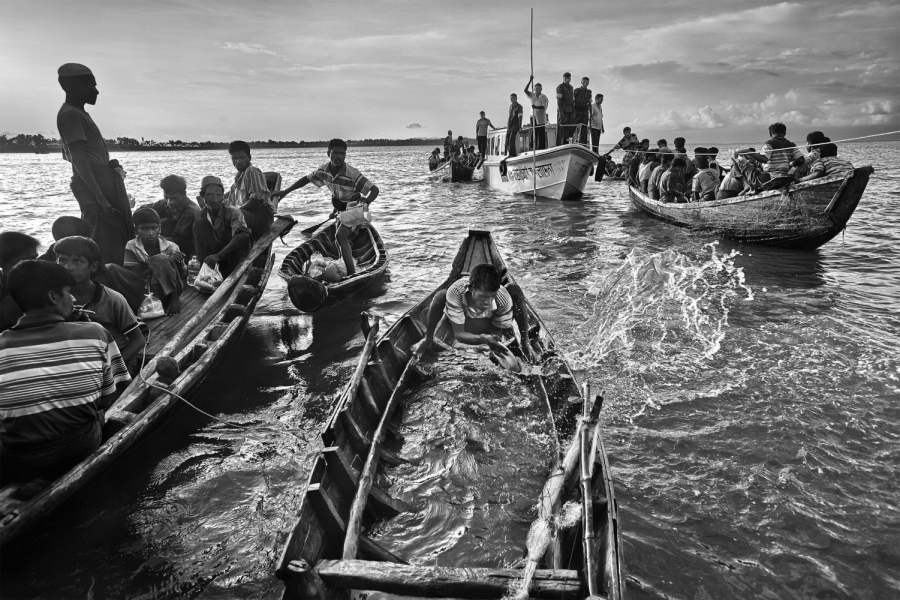Murshid Addresses Persecution of the Rohingya in Myanmar
Professor Murshid spoke on November 8 about the history and politics behind the ethnic cleansing of the Rohingya in Myanmar. The Rohingya are a mostly-Muslim ethnic minority group there.
On Wednesday, November 8, students and faculty gathered in Persson Auditorium to listen to Associate Professor of Political Science Navine Murshid speak on the persecution of the Rohingya people in Myanmar. In a talk entitled “Ethnic Cleansing in Myanmar: Why the Rohingya?” Murshid discussed the history of the Rohingya people in Myanmar and their conflict with the current Myanmarese government.
The Rohingya are a majority Muslim ethnic group with a population of over one million people within Myanmar (formerly Burma) before the events of the ethnic cleansing last year. Though the actions of the Myanmarese government towards the Rohingya population has only gained media attention recently, this treatment has deep roots in Myanmarese society.
The conflict between the Rohingya people and Myanmar’s government can be traced to the modern caste system implemented by the government. This system has three levels: full citizens, associate citizens and nationalized citizens. A person’s classification into one of these social levels relies on the individual’s history within the country. If an individual lived in Myanmar before British occupation, then he or she would be a full citizen.
The Myanmarese government categorized the whole of the Rohingya people as associate citizens because the majority of Rohingya people lacked the necessary papers. This place in the social hierarchy means that no Rohingya can hold public office within the country, effectively silencing a great number of Myanmarese constituents.
Murshid made the point that the actions Rohingya have taken for their freedom differ significantly from other minority ethnic groups within Myanmar. The Rohingya are not the only oppressed ethnic group within Myanmar, but they are the only group that attempts to deal with their oppression. Other minority groups would prefer to secede from the country and start their own nations, while the Rohingya would prefer to be Full Citizens in a caste system designed for oppression.
The religious differences between the majority Myanmarese population and the Rohingya also causes friction. The majority of Rohingya people practice Islam while the majority of Myanmar practices Buddhism. This difference allows some Myanmarese officials to link Islamic Extremism to the Rohingya people, often ignoring the situations this group is placed into.
Radicals within the Rohingya population practice guerrilla war tactics, but these strategies are not necessarily equivalent to Islamic Extremism. Murshid explained that these radicals had been placed into distressing situations, which often forces refugees to partake in illegal and sometimes violent endeavors.
Sophomore Sierra DeAngelo spoke on this subjugation.
“For me, the biggest takeaway of the talk was that evil acts could be committed even in the name of a philosophy as seemingly harmless as Buddhism. It was interesting to reflect on the impact that the issue’s ties to Buddhism had on its publicity. I’m sure that if the roles had been reversed, and Muslims were persecuting Buddhists, we would’ve heard about it. Manipulation by media is real,” DeAngelo said.
Bangladesh has recently opened its borders to Rohingya refugees. This contradicts previous actions, such as the closing of borders to the same group of people in 2012. Even in the relative safety provided by Bangladesh, the Bangladeshi government still treats them with disdain, similar to the behavior of the Myanmarese government. Bangladesh will restrict the travel abilities of Rohingya refugees and ban access to SIM cards, in the hope of curbing radicalism within refugee camps.
Senior Andrew DeFrank was also interested in the talk.
“Professor Murshid teaches my seminar, which is all about the politics of migration specifically in South Asia. As a result, I was interested in hearing her perspective on such a pressing and important part of South Asian migration today. I thought the talk was informative and engaging,” DeFrank said.
Contact Henry Claudy at [email protected].




